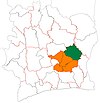Daoukro
Daoukro | |
|---|---|
Town, sub-prefecture, and commune | |
| Coordinates: 7°3′N 3°58′W / 7.050°N 3.967°W[1] | |
| Country | |
| District | Lacs |
| Region | Iffou |
| Department | Daoukro |
| Population (2014)[2] | |
| • Total | 73,134 |
| Time zone | UTC+0 (GMT) |
Daoukro is a town in east-central Ivory Coast. It is a sub-prefecture of and the seat of Daoukro Department. It is also the seat of Iffou Region in Lacs District. Daoukro is also a commune.
Administration
A law of 1978[3] established 27 full-service municipalities in the territory of the country.
| Date d'élection | Identité | Parti | Qualité | Statut |
|---|---|---|---|---|
| 1980 | Henri Konan Bédié | PDCI-RDA | Politician | elected |
| 1985 | Andoh Konan Jean | PDCI-RDA | Politician | elected |
| 1990 | Andoh Konan Jean | PDCI-RDA | Politician | elected |
| 1995 | Andoh Konan Jean | PDCI-RDA | Politician | elected |
| 2001 | Gnankou Konan | PDCI-RDA | Politician | elected |
Demographics
| Year | 1975 | 1988 | 2010 | 2014 |
|---|---|---|---|---|
| Population | 12 575 | 12 777 | 36 684[4] | 73 134[2] |
Education
|
Primary education
|
Secondary education
Public College
|
Languages
| Nouchi | |
|---|---|
| Native to | Ivory Coast |
| Language codes | |
| ISO 639-3 | None (mis) |
| Glottolog | nouc1234 |
Since independence, the official language throughout Ivory Coast has been French. The lingua franca, spoken and understood by the majority of the population, is Dioula, but the vernacular of the region is Baoulé. The French actually spoken in the region, as in Abidjan, is commonly called Ivorian Popular French or Moussa’s French[Note 1] that is distinct from standard French pronunciation and also uses specific words, which makes it almost unintelligible to non-Ivorians.
Another form of spoken French is Nouchi, a slang spoken mainly by young people and which is also the language in which two satirical magazines are written, Gbich! and Y Fohi.
Since Daoukro Department receives many Ivorians from all over the country, all the vernacular languages of the country (about sixty) are practiced.
Sports
The city has two football clubs, the RFC Daoukro, finalist of the Cup of Cote d'Ivoire football in 2002, and AS Daoukro, which competes in the Division Regional Championship, the equivalent of a fourth-tier division[5] Both teams play their home games at Daoukro Municipal Stadium. As in most cities, it is organized, informally, tournament football players to seven, very popular in Ivory Coast, are called Maracanas. In 2008, Daoukro was a city-stage of the Tour of White Gold: the stage was won by the Ivorian rider Balima Mahamadi.
Figures linked to the city
- Henri Konan Bédié (politician, President of the Republic of 1995 to 1999, chairman of PDCI-RDA)
- Gnamien N'goran (homme politique, Minister of Economy and Finance de 1995 à 1999)
- Henriette Lagou, Minister of Social Action
- Lamine Konaté, representing RDR
Villages
The 18 villages of the sub-prefecture of Daoukro and their population in 2014 are.[6]
- Agni-Assikasso (2 798)
- Anoumabo (2 323)
- Assuéti (1 375)
- Bénanou (1 736)
- Dadiékro (693)
- Daoukro (44 342)
- Dengbé (1 523)
- Kongoti (1 297)
- Kouassi-Diétèkro (1 435)
- Koutoukounou (1 089)
- Abbo-Kénégny (528)
- Allokokro (1 891)
- Komenan-Yaokro (1 778)
- Lagoukro (1 920)
- Léki - Kouadiokro (1 539)
- Lékikro (2 581)
- N'guessankro (2 271)
- Pepressou (2 015)
Notes
- ^ "français de Moussa".
- ^ "Ivory Coast Cities Longitude & Latitude". sphereinfo.com. Archived from the original on 13 September 2012. Retrieved 19 November 2010.
- ^ a b "Côte d'Ivoire". geohive.com. Retrieved 7 December 2015.
- ^ Loi no 78-07 du 9 janvier 1978
- ^ Fiche de la ville sur le site du world gazetteer
- ^ Championnat de Football de Cote d'Ivoire
- ^ "RGPH 2014, Répertoire des localités, Région Iffou" (PDF). ins.ci. Retrieved 5 August 2019.


